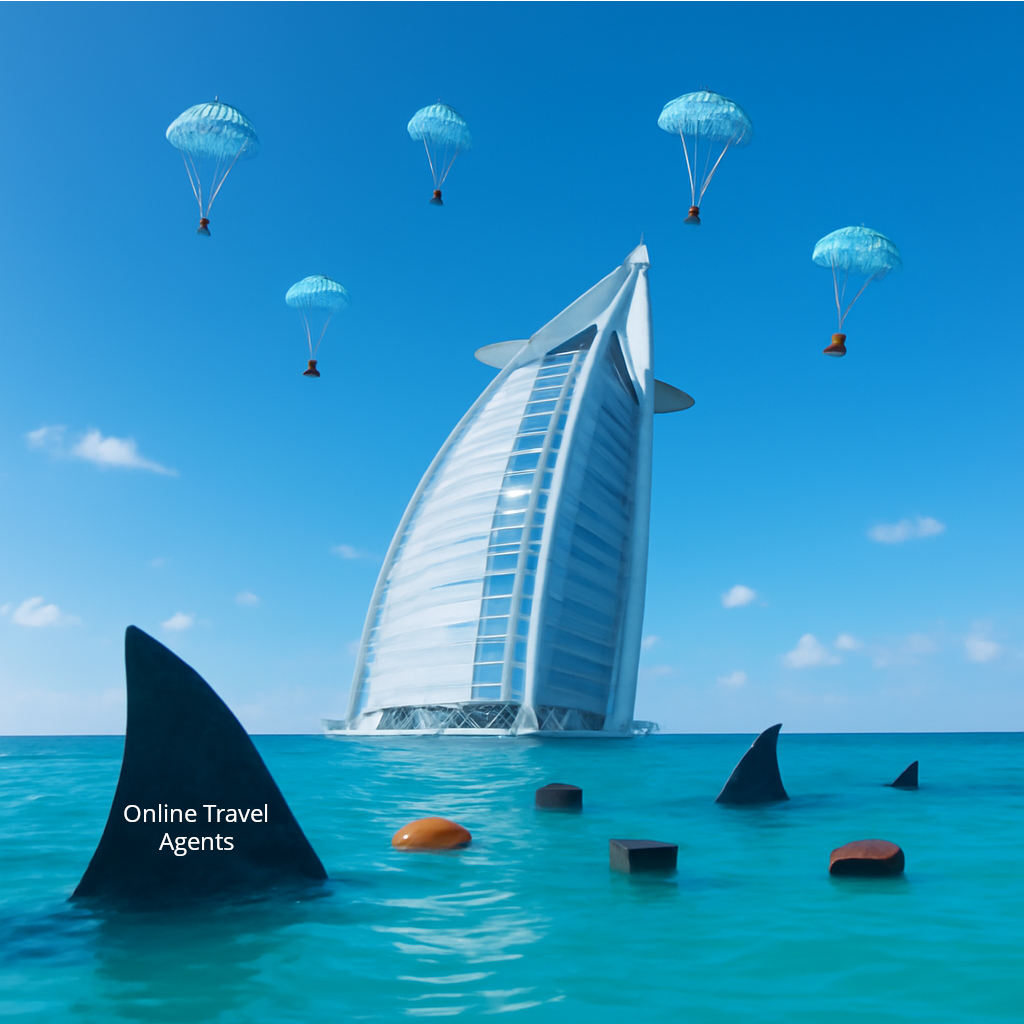5 Google Ads Strategies that will reduce your monthly commission cheques by more than 70%
Hotel’s that use Digital Marketing Agencies where they are being charged a commission only when a booking is made need to watch out! While true that this type of commercial arrangement is painless, we have not yet found a case where the way bookings are being attributed to the campaigns are questionable.
In this post we’ll cover 5 things you can do at your hotel to gauge whether your hotel is paying too much in commissions. If you get a lot of “ums” and “ahs” when asking your provider, that’s a sign that your revenues are being cleaned out, and we’d invite you to get in touch so we can provide you with an alternative solution.
1. SWITCH YOUR PPC MODEL FROM 100% COMMISSION ON REVENUE TO HYBRID OR FIXED RATE
Generally, if your PPC campaigns are “working really well” it is a euphemism for giving away your hotel’s revenues away via this model easily. Instead your hotel could easily own this booking at a fraction of the cost. If there exists a choice between a 100% model and a hybrid model (where you pay less commission per booking, but assume the cost of media spend for the campaigns) switch to hybrid now. If you are one of the unlucky hotels that is using a 100% commission model get in touch and let us tell you the saving. For a medium sized hotel running brand campaigns that saving should be upwards of 70% - IE take 70% off the amount of commission you are currently paying each month.
2. DEMAND TO SEE REVENUE ATTRIBUTION IN GOOGLE ANALYTICS
Make it a requirement to track all revenue and transactions brought via these managed PPC campaigns to your hotel’s Google Analytics account. Know that special parameters (UTM) can be hardcoded into the campaign URLS which will make your hotel’s PPC campaigns appear neatly in Google Analytics. In this way you can easily see their performance.
If, as part of your current contract, you are being asked to log in to a 3rd party website to check the bookings the campaigns have delivered, how can you be sure that those figures are correct? How can you perform an audit with your own Google Analytics data?
Periodically sanity checking revenue and commission reports is part of good practice. Imagine if you were being charged a commission on a booking that actually came from a newsletter your hotel sent out, or social media campaign your in-house marketing team launched? This is why commission-based marketing services can cost your hotel dearly if they are not checked and audited regularly.
3. DON’T ACCEPT THE FIRST REVENUE ATTRIBUTION MODEL YOU ARE OFFERED!
Performance marketing - where a provider’s fees are linked to your revenue - are fine in the offline world. A special reservation code can be created that a sales agent uses when making a booking. The Revenue Manager runs a sales report, sees the revenue, and pays a commission according to the terms.
Commission agreements in the online format are much less perfect - even if the previous approach is possible - we guarantee that most providers of commission-based models won’t want to touch them with a barge pole and that’s because view through conversions allow them to invoice you for more commissions each month.
The difference between a view-through conversion (User sees an advertisement, doesn’t click it, but at a later time went on to book) and a click-through conversion (User sees an advertisement, clicks on it and then books) means that if a hotel is not careful, it will end up paying commissions completely unnecessarily.
A good view-through conversion example is to imagine that you are looking out of your car window to the left as you drive past an advertising billboard with your hotel on the right. Later in the day you go on to book the hotel. The view through conversion assumes that your booking was due to the billboard (that you didn’t see!). That morning you received a newsletter in from the hotel with a deal, that’s why you booked. The booking is instead given to the view-through conversion channel. That’s why display re-marketing is always bundled in as “must-have” – it extends the scope and ability of the provider to clean you out via this type of attribution model.
If getting the banner click (click conversion) is no longer necessary to capture the booking then to game the system all a provider would need to do is purchase advertising on major newspapers or other highly trafficked websites that your guests might be expected to visit during their normal day, this would then steal away the booking attribution from any other channel to make it available to charge back to you as a booking with their commission on top., when in fact they were just being cunning with the view-through conversion attribution model. Contact Internet Affected and let us see how badly it’s affecting your hotel and what savings you can expect with our pricing model.
Therefore, before agreeing to any form of display re-marketing, make sure you stipulate that view-through conversions are valid for no more than one day, and that click-through conversions for 30 days. This will at least stop your hotel hemorrhaging commissions via this digital attribution hustle. The best thing is to remove view-through conversion attribution completely from commission based marketing models. The outcome will be that you pay less commission and the Supplier will have to work on improving their ads to get their commissions.
4. DON’T JUST GET REVENUE REPORTS, ASK FOR MEDIA SPEND REPORTS AS WELL.
Our PPC services use a fixed-fee, that means our hotels can easily see what we are spending on their campaigns, and the value added of our unique management. By contrast performance-based providers typically hide the media spend from their reporting. Instead they focus on the big revenue numbers as they sound impressive.
If they really were “partners invested in your hotel’s success” there would be no-reason to hide this information from you, don’t you think?
Providers will be loathed to share the information about what they spend each month on your Google Ads brand campaigns because they are making a good slice of their revenue off it.
Today’s advertising marketplace is not the same as it was 10 years ago. Hotel’s can now manage their own paid search campaigns using technology that was historically in the hands of the OTAs. In fact, look at the OTAs and while they are still making money, they are up against it when faced with a hotel that is managing their brand directly. Google will also give your hotel more favour (a brand lift) than their OTAs advertisers, meaning you will pay less for your brand name than an OTA, meaning you can always appear in the top spot.
Your hotel must own its own Google Ads account and then grant an agency access (not the other way around). Your Google Analytics account should be set to receive ad-spend and be linked from Google Ads to allow you see clearly how much is being spent on your campaigns each month. These are literally button clicks to integrate, anything you are told about it being complicated is simply untrue.
5. AVOID INADVERTENTLY COMPETING WITH YOUR HOTEL REPRESENTATION AGENCIES.
If your hotel uses a Representation agency, they might also have their own booking engine and loyalty scheme. Some agencies will offer hotels the chance to run PPC on their behalf. While this might be convenient, especially where the hotel does not have PPC budget available, if you are competing in Google Ads or Google Hotels Ads with your representation agency, this could have a negative effect, such as pushing up your hotel’s own advertising costs. A careful analysis needs to take place to see whether or not using your Representation agencies ads as a blocking strategy for OTAs is better than asking them to stop advertising on your brand outright and owning the channel.
As digital marketers our concern is that when a hotel’s brand visitors get diverted to their Representation agencies or any other provider, that visitor might end up being attracted to another hotel featured on their website. For the Representation agency they are still adding value to a hotel client (just not yours) and this was a visitor that started their Google search looking for your hotel!
There may in fact be opportunities in sharing the financial burden of PPC campaigns - where the Representation agency is given license to bid on your hotel brand in low-value territories, leaving more media spend budget available for your hotel’s primary territories while gaining this additional exposure. Idem granting a license to target your hotel brand in specific foreign languages. Hotel’s should check-in with their Representation agencies to see that the hotel brand is not being sold in an unrestricted way. Bottom of funnel hotel brand searches are guests very close to booking, you don’t want to be giving them away easily.
CONCLUSION
Move away from 100% commission models for your digital marketing. While convenient your hotel is paying a premium in commissions that it could avoid. Expect savings of 70% and beyond when switching to a fixed fee, with the added benefits of repositioning your hotel’s brand at the centre of its own online empire – Once you own your Google Ads account you will get unique data insights that are not available if you are being managed through an agency account.
If you like this post, do share it with your networks, you can also join our newsletter (below) or our free marketing club for additional insights and Google Analytics Dashboards your teams can download and use for better digital marketing anaylsis.
About the Author
Glyn Spencer Hopkins is the owner of Internet Affected and has been working exclusively with hotels for over a decade.
Internet Affected provides web marketing services tailored to the individual personalities of hotels; a complete range of digital services designed to help them take back ownership of their hotel brand from the OTAs. Specialized marketing solutions to increase guest loyalty, food & beverage bookings, events and wedding inquiries, clearly reported in straightforward language.











